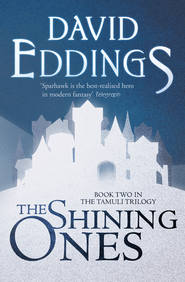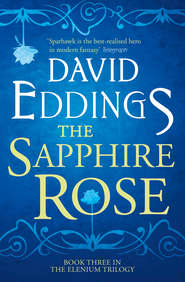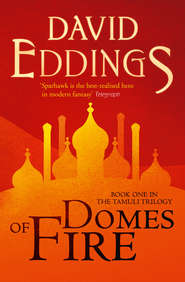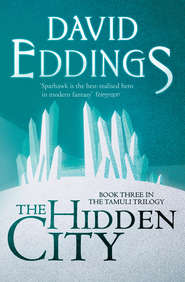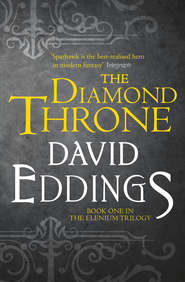По всем вопросам обращайтесь на: info@litportal.ru
(©) 2003-2025.
✖
Belgarath the Sorcerer and Polgara the Sorceress: 2-Book Collection
Автор
Год написания книги
2019
Настройки чтения
Размер шрифта
Высота строк
Поля
I’ve had better offers, but I decided not to negotiate. I was here to learn, not to correct bad manners.
‘You seem reluctant,’ he observed.
‘I’m not the wisest of men, Master,’ I confessed, ‘and I have little skill with magic. I would be more happy if this burden had been placed on another.’
‘It is yours to bear, however,’ he roared at me. ‘Behold the gift which is mine to give.’ He quickly sizzled out a design on the top of the water with a burning forefinger, evidently not observing that the swift current of the stream carried it off before he’d even finished his drawing.
He raised a Demon Lord, one of the Disciples of the King of Hell. Now that I think back on it, I believe it was Mordja. I met Mordja many years later, and he did look a bit familiar to me. ‘What is this thou hast done?’ Mordja demanded in that awful voice of his.
‘I have summoned thee to obey me,’ my prospective tutor declared, ignoring the fact that his protective design was a half-mile downstream by now.
Mordja – if it was Mordja – laughed. ‘Behold the face of the water, fool,’ he said. ‘There is no longer protection for thee. And, therefore – ’ He reached out one huge, scaly hand, picked up my prospective ‘master’, and bit off his head. ‘A bit thin,’ he observed, crushing the skull and brains with those awful teeth. He negligently tossed away the still-quivering carcass and turned those baleful eyes on me.
I left rather hurriedly at that point.
I eventually found a less demonstrative magician who was willing to take me on. He was very old, which was an advantage, since the apprentice to a magician is required to become his ‘master’s’ slave for life. He lived alone in a dome-shaped tent made of musk-ox hides on a gravel bar beside one of those streams. His tent was surrounded by a kitchen midden, since he had the habit of throwing his garbage out the front door of his tent rather than burying it. The bar was backed by a thicket of stunted bushes that were enveloped by clouds of mosquitoes in the summertime.
He mumbled a lot and didn’t make much sense, but I gathered that his clan had been exterminated in one of those wars that are always breaking out amongst the Morindim.
My contempt for ‘magic’ as opposed to what we do dates from that period in my life. Magic involves a lot of meaningless mumbo-jumbo, cheap carnival tricks, and symbols drawn on the ground. None of that is really necessary, of course, but the Morindim believe that it is, and their belief makes it so.
My smelly old ‘master’ started me out on imps – nasty little things about knee-high. When I’d gotten that down pat, I moved up to fiends, and then up again to afreets. After a half-dozen years or so, he finally decided that I was ready to try my hand on a full-grown demon. In a rather chillingly off-hand manner, he advised me that I probably wouldn’t survive my first attempt. After what had happened to my first ‘master,’ I had a pretty good idea of what he was talking about.
I went through all the nonsensical ritual and raised a demon. He wasn’t a very big demon, but he was as much as I wanted to try to cope with. The whole secret to raising demons is to confine them in a shape of your imagining rather than their natural form. As long as you keep them locked into your conception of them, they have to obey you. If they manage to break loose and return to their real form, you’re in trouble.
I rather strongly advise you not to try it.
Anyway, I managed to keep my medium-sized demon under control so that he couldn’t turn on me. I made him perform a few simple tricks – turning water into blood, setting fire to a rock, withering an acre or so of grass – you know the sort of tricks I’m talking about – and then, because I was getting very tired of hunting food, I sent him out with instructions to bring back a couple of musk-oxen. He scampered off, howling and growling, and came back a half-hour or so later with enough meat to feed my ‘master’ and me for a month. Then I sent him back to Hell.
I did thank him, though, which I think confused him more than just a little.
The old magician was very impressed, but he fell ill not long afterward. I nursed him through his last illness as best I could and gave him a decent burial after he died. I decided at that point that I’d found out as much as we needed to know about the Morindim, and so I discarded my disguise and went back home again.
On my way back to the Vale I came across a fair-sized, neatly thatched cottage in a grove of giant trees near a small river. It was just on the northern edge of the Vale, and I’d passed that way many times over the years. I’ll take an oath that the house had never been there before. Moreover, to my own certain knowledge, there was not another human habitation within five hundred leagues, except for our towers in the Vale itself. I wondered who might have built a cottage in such a lonely place, so I went to the door to investigate these hardy pioneers.
There was only one occupant, though, a woman who seemed young, and yet perhaps not quite so young. Her hair was tawny and her eyes a curious golden color. Oddly, she didn’t wear any shoes, and I noticed that she had pretty feet.
She stood in the doorway as I approached – almost as if she’d been expecting me. I introduced myself, advising her that we were neighbors – which didn’t seem to impress her very much. I shrugged, thinking that she was probably one of those people who preferred to be alone. I was on the verge of bidding her good bye when she invited me in for supper. It’s the oddest thing. I hadn’t been particularly hungry when I’d approached the cottage, but no sooner did she mention food than I found myself suddenly ravenous.
The inside of her cottage was neat and cheery, with all those little touches that immediately identify a house in which a woman lives as opposed to the cluttered shacks where men reside. It was quite a bit larger than the word ‘cottage’ implies, and even though it was none of my business, I wondered why she needed so much room.
She had curtains at her windows – naturally – and earthenware jars filled with wildflowers on her window-sills and on the center of her glowing oak table. A fire burned merrily on her hearth, and a large kettle bubbled and hiccuped over it. Wondrous smells came from that kettle and from the loaves of freshly baked bread on the hearth.
‘One wonders if you would care to wash before you eat,’ she suggested with a certain delicacy.
To be honest, I hadn’t even thought about that.
She seemed to take my hesitation for agreement. She fetched me a pail of water, warm from the hearth, a cloth, a towel of sorts, and a cake of brown country soap. ‘Out there,’ she told me, pointing at the door.
I went back outside, set the pail on a stand beside the door, and washed my hands and face. Almost as an afterthought, I pulled off my tunic and soaped down my upper torso as well. I dried off with the towel, pulled my tunic back on, and went inside again.
She sniffed. ‘Much better,’ she said approvingly. Then she pointed at the table. ‘Sit,’ she told me. ‘I will bring you food.’ She fetched an earthenware plate from a cupboard, padding silently barefooted over her well-scrubbed floor. Then she knelt on her hearth, ladled the plate full, and brought me a meal such as I had not seen in years.
Her easy familiarity seemed just a bit odd, but it somehow stepped over that awkwardness that I think we all feel when we first meet strangers.
After I’d eaten – more than I should have, probably – we talked, and I found this strange, tawny-haired woman to have the most uncommon good sense. This is to say that she agreed with most of my opinions.
Have you ever noticed that? We base our assessment of the intelligence of others almost entirely on how closely their thinking matches our own. I’m sure that there are people out there who violently disagree with me on most things, and I’m broad-minded enough to concede that they might possibly not be complete idiots, but I much prefer the company of people who agree with me.
You might want to think about that.
I enjoyed her company, and I found myself thinking up excuses not to leave. She was a remarkably handsome woman, and there was a fragrance about her that made my senses reel. She told me that her name was Poledra, and I liked the sound of it. I found that I liked almost everything about her. ‘One wonders by what name you are called,’ she said after she’d introduced herself.
‘I’m Belgarath,’ I replied, ‘and I’m first disciple of the God Aldur.’
‘How remarkable,’ she noted, and then she laughed, touching my arm familiarly as if we’d known each other for years.
I lingered in her cottage for a few days, and then I regretfully told her that I had to go back to the Vale to report what I’d found out in the north to my Master.
‘I will go along with you,’ she told me. ‘From what you say, there are remarkable things to be seen in your Vale, and I was ever curious.’ Then she closed the door of her house and returned with me to the Vale.
Strangely, my Master was waiting for us, and he greeted Poledra courteously. I can never really be sure, but it seemed to me that some mysterious glance passed between them as if they knew each other and shared some secret that I was not aware of.
All right. I’m not stupid. Naturally I had some suspicions, but as time went by, they became less and less important, and I quite firmly put them out of my mind.
Poledra simply moved into my tower with me. We never actually discussed it; she just took up residence. That raised a few eyebrows among my brothers, to be sure, but I’ll fight anyone who has the bad manners to suggest that there was anything improper about our living arrangements. It put my will-power to the test, I’ll admit, but I behaved myself. That always seemed to amuse Poledra for some reason.
I thought my way through our situation extensively that winter, and I finally came to a decision – a decision Poledra had obviously made a long time ago. She and I were married the following spring. My Master himself, burdened though he was, blessed our union.
There was joy in our marriage, and a kind of homey, familiar comfort. I never once thought about those things which I had prudently decided not to think about, so they in no way clouded the horizon. But that, of course, is another story.
Don’t rush me. We’ll get to it – all in good time.
Chapter 10 (#ulink_024b2661-4eb6-57a1-ac60-ffb7e9643b59)
I’m sure you can understand that I wanted peace in the world at that particular time. A newly married man has better things to do than to dash off to curb the belligerence of others. Unfortunately, it was no more than a couple of years after Poledra and I were married when the Alorn clan wars broke out. Aldur summoned the twins and me to his tower as soon as word of that particular idiocy reached us. ‘Ye must go there,’ he told us in a tone that didn’t encourage disagreement. Our Master seldom commanded us, so we paid rather close attention to him when he did. ‘It is essential that the current royal house of Aloria remain in power. One will descend from that line who will be vital to our interests.’
I wasn’t too thrilled at the prospect of leaving Poledra behind, but I certainly wasn’t going to take her into the middle of a war. ‘Wilt thou look after my wife, Master?’ I asked him. It was a foolish question, of course. Naturally he’d look after her, but I wanted him to understand my reluctance to go to Aloria and my reasons for it.
‘She will be safe with me,’ he assured me.
Safe, perhaps, but not happy about being left behind. She argued with me about it at first, but I led her to believe that it was Aldur’s command – which wasn’t exactly a lie, was it? ‘I won’t be all that long,’ I promised her.
‘Don’t be,’ she replied. ‘One would have you understand that one is discontented about this.’
Anyway, the twins and I left the Vale and started north the first thing the next morning. When we reached the cottage where I’d met Poledra, the she-wolf was waiting for us. The twins were somewhat surprised, but I don’t think I really was. ‘Another of those errands?’ she asked me.
‘Yes,’ I replied flatly, ‘and one does not require company.’







